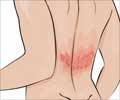Symptoms and Diagnosis
You can know the type of pollen allergy you’re suffering from depending on the period of year when you are most affected. You are most likely to suffer from pollen allergy when:
- Trees pollinate (during spring season)
- Grass and weeds pollinate (during early summer)
- Weed allergens are potent (in autumn)
Whether you are allergic to pollens from trees, grass or weeds, pollen allergy has a detrimental effect on your nose, throat, voice box (larynx), trachea and the bronchioles. You may at first, suspect having caught summer cold, but gradually, the cold lingers on. If you develop a respiratory illness that lasts longer than 1-2 weeks, it’s important to seek medical attention.
Following are the common symptoms of pollen allergy:
- Sneezing along with runny or clogged nose.
- Coughing and postnasal drip
- Itching eyes, nose and throat
- Redness and watering of eyes Dark circles under the eyes caused by restricted blood flow near the sinus
- Conjunctivitis – inflammation in the eyes
- Dullness and fatigue
- Shortness of breath or trouble in breathing
- Sore throat
Birch species are small to medium-size trees or shrubs, of temperate climates. The pollens of such species usually act as allergen. Few of such species are apples, carrots, celery, hazelnuts, peaches, pears and raw potatoes. Sometimes, people develop food hypersensitivity such as allergy to nuts, fruits or roots. A study published in the journal Allergy, surveyed 600 patients with pollen allergy for food hypersensitivity. Researchers found that patients with birch pollen allergy were 70 percent more likely to develop hypersensitivity to various nuts, fruits and roots as compared with those without birch pollen allergy. They concluded that in the diagnosis of springtime hay fever, the presence of hypersensitivity to nuts, fruits and roots supports a diagnosis of birch pollen allergy.
Some people suffering from pollen allergy have a tendency of developing asthma, a respiratory condition. Asthma may recur every year during pollen season and eventually it can become chronic.
Diagnosis of Pollen Allergy
- Symptomatic diagnosis
- Skin testing is recommended using pollens commonly found in the local area
- Blood sample testing from the patient to detect levels of IgE antibody to a particular allergen


















